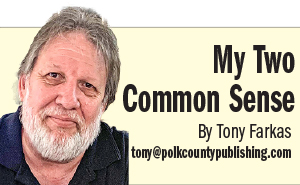
In my 40 years of dancing around the halls of journalism, I have one story that when people ask me what my favorite interview was, I relate the story of the Szaloys in Quay County, N.M.
The old man was the son of one of the original homesteaders of that area, around the turn of the last century, and his recounting of the events he lived through were riveting and peppered with humorous phrases.
One of the events in the early 1900s was a snowstorm that lasted for days, which for people at that time was very dangerous. The family had prepared by cutting firewood, but the storm was so bad and so long that they burned through their stockpile.
He then said, “After we burned all the firewood, we looked at the fenceposts we had cut. At first, we burned only the crooked ones. Pretty soon they were all crooked.”
The upshot was that at that time, what they had wasn’t enough, at that has been the problem with the federal government for decades. Their spending habits have been out of control for so long that there seemingly is never enough cash around for them to fund everything they claim needs funding.
Or, as Margaret Thatcher said, “The problem with socialism is you eventually run out of other people’s money.”
So in the latest bid to elect an overspender (Kamala Harris), a tax plan has come to light with is supposed to fix the money flow — the unrealized gains tax. In a very tiny nutshell, it’s a tax on income that you could have made.
The income tax started in 1861 during the Civil War, a 3 percent flat tax on incomes over $800, which was repealed 11 years later. In 1913, the 16th amendment gave the government power to levy taxes on income, since the money coming in from tariffs and excise taxes were not enough to cover the growing needs of the country.
From there, the fenceposts started to become crooked; initially, sales from stocks didn’t qualify as income, but the money pit that Washington, D.C., has become needs to be fueled, so things were changed. Soon, anything that could remotely be considered as income — interest on bank accounts, rental income (if you own property), even the swag bags given to presenters at the Oscar celebrations.
In short, if you received it via any means, it was income — you know, crooked wood for the fire.
Of course, government’s appetite for money has only grown exponentially (while our income hasn’t), so now the definition is changing again.
Harris is touting the 25 percent unrealized capital gains tax, which would be placed on personal and business assets, nominally for people with $100 million or more in wealth. We all know, though, that once the foot is in that particular door, it’s only a matter of time before that changes, because the money must flow.
How it works is you own a piece of property that costs $500,000 (a value, of course, set by the government as well). If the value of that property goes up $50,000, then you own the feds $12,500, whether you sold the property or not.
Guess what happens if it goes up again the following year?
If you can’t pay, then of course, you can take out a loan, and if you can’t, you lose the property. Simple, huh?
At no time, that I can see, has a plan been put into place to address debt, budget deficits or any government overspending; just more promises of giveaways in order to buy votes, which in turn creates an even greater need for money, and the beat goes on.
The Founding Fathers wanted to protect private property rights. Our current leaders want to protect your private property from, well, you.
Tony Farkas is editor of the San Jacinto News-Times and the Trinity County News-Standard. He can be reached at [email protected].








Comment
Comments